Fines And Fiestas Chapter 1
Another Early Morning Call
The telephone began to ring at six on the dot, which meant it was either England or trouble. England had the decency to be one hour behind. Trouble rarely checked the clock.
“Hola,” I said, because in Spain one begins the day with good manners and low expectations.
“Perdón por la hora, Señor Steve.” Sergeant Alfonso. If the Guardia Civil called you at that time, you either had a problem or a story. With Alfonso, it was usually both.
“Everyone all right?” I asked, climbing from sleep to duty. Wife, office, clients, paperwork—the usual mental roll call.
“Todos bien,” he said. “Except… ‘Grandfather’.”
George again. In England he would have been “Mr. So-and-So.” In our village he’d long ago been promoted to a communal relative: Abuelo grandfather to the barman, the children, and—on mornings like this—the police.
“What’s he done?”
“A shortcut,” Alfonso said, with the regret of a man obliged to announce rain on a wedding day. “Through the cemetery. In the car.”
Only George would take a Fiat Panda called Doreen across consecrated ground. Only George would wedge her sideways on the church steps and fall asleep with the engine ticking like a clock in a quiet room.
“We have inspection at eight,” Alfonso went on. “If he is still here, I have regulations. I have to book him .”
“How much?”
“Diez mil pesetas.”
Fifty pounds to keep a legend out of a file and court . I was out of bed and into yesterday’s trousers before the receiver had settled.
The station smelt of polish and resignation. Alfonso met me in the corridor, immaculate as always, cap under his arm and a smile that said he’d seen worse and preferred not to.
“In there,” he nodded.
George was perched on a chair, three-piece suit, dancing shoes, and the air of a man briefly detained between parties. He was eating a ham roll with the piety of a saint.
“Steve, my boy!” He beamed as if I’d surprised him at his birthday. “You’re an angel.”
“Not today,” I said, signing where Alfonso pointed. “Today I’m your overdraft.”
George patted his pockets as if money might materialise by applause. “I’ll see you right,” he promised, the eternal IOU. We both knew he wouldn’t. The village got more from George than George ever took.
Alfonso slid the receipt across. “Please remove him,” he said in English, the way one might request the removal of a stray dog from a baker’s.
Outside, Doreen sulked at the curb, brought round by Ernesto one of the Guardia, left with her engine ticking over , blue smoke curling from the exhaust like an embarrassed curtain. The church steps bore a tyre mark and the faint smell of penance.
“How did you manage it?” I asked.
“Faith,” said George. “And first gear.”
We set off at a dignified crawl, Doreen protesting at every pious bump. I steered; George waved like a minor royal.
Bar Pueblo had opened its shutters to the morning. We installed George at a corner table with a coffee and a glass of water. He added a sliver of anise to both.
“You’ll kill the taste,” I said.
“That,” said George, “is the point.”
By eight the plaza had gathered its usual jury: the baker with his floury arms; Rosa with her clipboard; two pensioners who considered traffic an academic subject. Word travels quickly in a small town. The cemetery, the steps, the inspection, the fine—by pastry number three, the story had acquired orchestration.
“Shortcut?” asked the baker, delighted. “Through the holy ground?”
“Tradition,” said George. “Romans built straight roads. I merely followed precedent.”
Rosa sniffed. “You’re going to apologise to Father Miguel.”
“Already did,” said George. “He suggested I might like to confess.”
“And did you?” I asked.
“I did not,” said George. “Confession is for sins one regrets.”
Laughter loosened the air. The day settled on its rails. Alfonso passed by the window, caught my eye, and mimed coffee. I raised my cup. He touched his cap.
By ten I’d been to the office, reassured England, and discovered that two clients had decided not to buy their dream because their dog had taken against the plane. By noon the tyre mark on the steps had become a parable; by one the inspector had been and gone, and Alfonso’s paperwork was immaculate. Life, like a Spanish queue, had straightened itself without anyone admitting who’d been there first.
I walked back through the heat to Bar Pueblo and found George with a plate of tapas he hadn’t ordered and two children teaching him a card game he swore he didn’t understand. He looked up and grinned the grin of a man who had escaped consequences again by the narrowest of margins.
“You’re a hazard,” I told him.
“I,” said George, “am the local colour.”
And there, for the moment, we left it: the church unscathed, Doreen repentant, the village amused, and my day—inevitably—already two hours late.
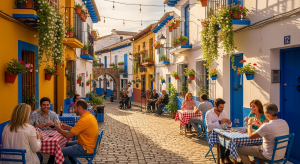
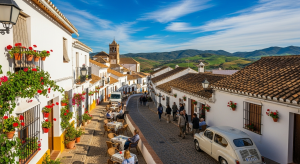

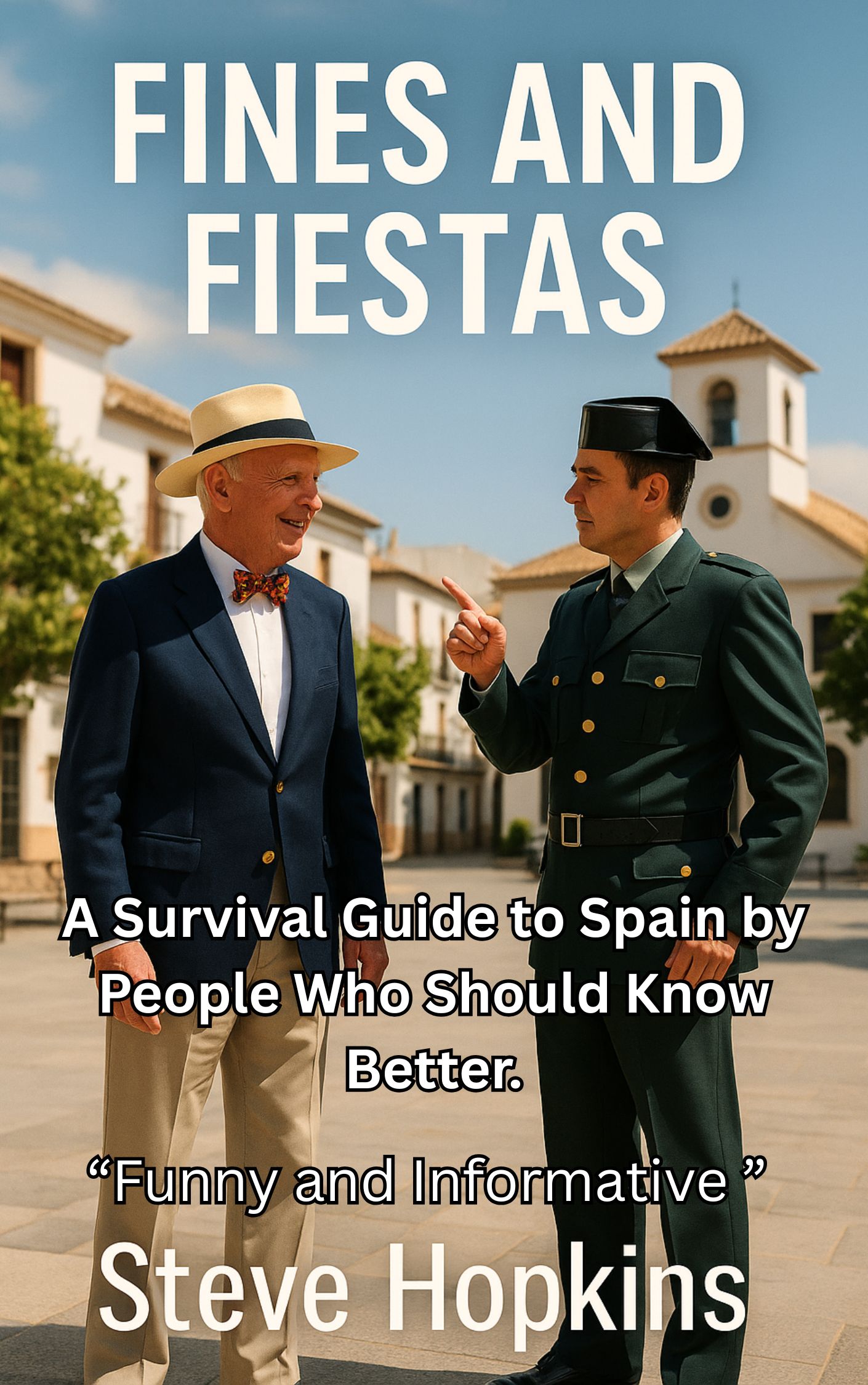


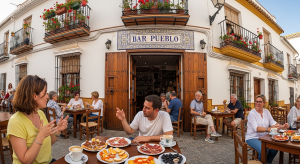
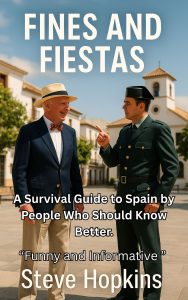



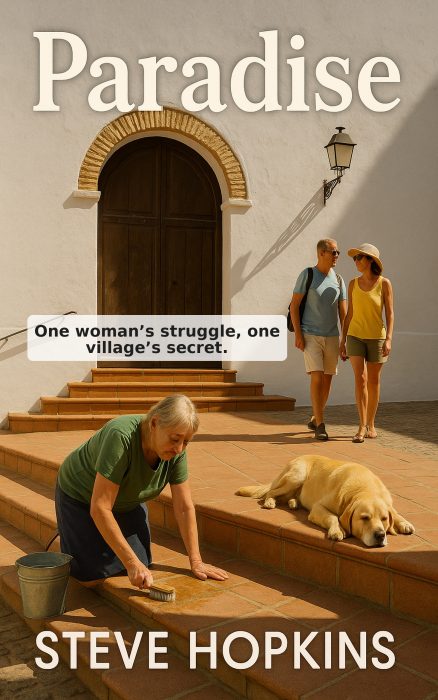
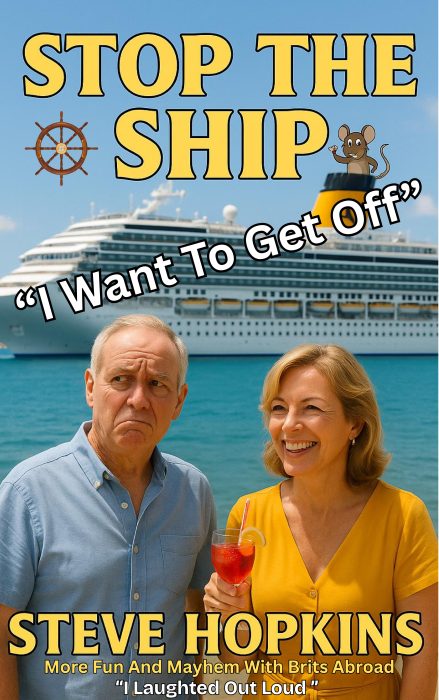
stevehopkinsdirect
3. Easy to Read, Hard to Put Down
“This is one of those books you can leave on the coffee table, pick up for ten minutes, and suddenly find you’ve been reading for an hour. Every chapter stands alone, yet together they paint a hilarious and heart warming picture of expat life. A perfect holiday or bedtime read.”
stevehopkinsdirect
4. For Expats & Dreamers Alike
“Whether you live in Spain or just dream of it, this book will speak to you. Hopkins captures the quirks of village life with humour and affection. The fiestas, the bureaucracy, the unexpected fines — it’s all here. A witty, entertaining read that’s both funny and true to life.”